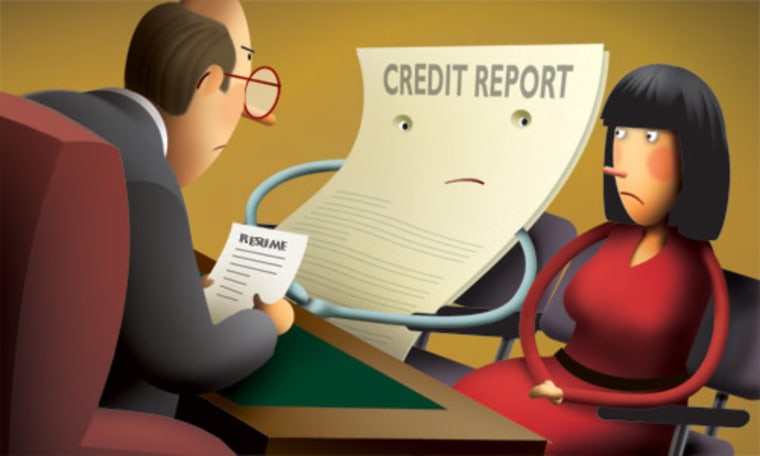Many job seekers are stuck between a rock and a hard place right now.
You’ve lost your job, so you’re having trouble paying bills on time, and that’s hurt your credit scores. At the same time, employers are increasingly using your credit history to make hiring decisions.
“Most hiring entities have stepped up all due diligence efforts when it comes to the hiring process. A credit report just happens to be one piece of the puzzle vis-à-vis a full background check,” says Jay Meschke, president of executive search firm EFL Associates, an affiliate of business services company CBIZ.
Indeed, lately I’ve been getting lots of e-mails from readers outraged about such employment credit checks.
“Americans’ credit scores are getting lower because they've been laid off and are having trouble paying bills, and they can't get hired to make money to pay the bills because their credit score is ‘too low,’ even though they may normally have a good score,” writes Lynn B., who was recently laid off from a telecommunications company. “I’m just kind of shocked.”
Unfortunately, the practice may be here to stay. But that doesn’t mean job hunters don’t have rights.
While checking an applicant’s financial history was standard practice when it came to jobs in banking, for example, hiring managers in many industries now see credit checks as a way to find out more about the people they are considering hiring.
“Employers reviewing a credit report want to see that the applicant is financially stable, not overextended, and meeting his or her obligations in a responsible manner,” says Sam Davidson, customer service manager with Bills.com.
The credit information is important, Meschke adds, when comparing two applicants. “If, for example, an applicant reports a significant level of personal debt obligations or credit delinquencies that might distract that person from his/her job responsibilities, then a hiring entity may take that information into consideration when comparing such an applicant to another comparative candidate without such distractions.”
While it seems to make sense for employers, it’s causing a lot of heartache for employees.
Here are some of your questions:
I have answered many help wanted ads and have gotten very little response. Some of the responses are questions regarding my credit score. Is this something new? I did talk to a friend of mine and she told me her previous employer asked before continuing the application/interview process. I don't feel that that has any bearing on my qualifications, experience and education. Is it legal for employers to ask this information of people applying for work?
— Lynn B.
Alas, it’s entirely legal for a prospective employer to request your credit report. But they can’t do that without your explicit permission.
If you refuse to give the hiring manager authority to pull your report because there’s stuff on it you don’t want them to see, or you just think it’s an invasion of privacy, you have every right to do that.
Unfortunately, the employer also has every right not to give you a job.
If you do agree to let them see the report, and they base their decision not to hire you on something in it, you have the right under the Fair Credit Reporting Act to see it, says EFL’s Meschke. This will give you an opportunity to try to explain or rectify any issues or errors that may be on there.
The best thing to do is to get a copy of your credit report right now and make sure there’s nothing on it that could derail your chances of landing a gig.
Under the Act, the credit reporting firms — TransUnion, Equifax and Experian — are required to give you a copy of your report for free once a year.
Also, if you do have stuff on there that may make an employer nervous, tell them upfront so there are no surprises when they see it, says Tim Mohr, a certified fraud examiner and partner with BDO Consulting.
I just filled out another database job application and cannot understand how a company can have the gall to ask for my Social Security (number) and personal references at the initial stage. With all the security breeches we've heard about, how can I be sure the company is trustworthy and their database is secure? I do not give them my information even though I know by not filling in the information, I will not get the job. Usually, I just put in 123-45-6789 for the Social Security number. I know this knocks me off their list, but I don't know them, and I don't give that information out to just anyone. It's like going out on a blind date. What should I do?
— J.G. from New Jersey
You’re doing the right thing. This is probably a date you don’t want to go on.
Don’t, don’t, don’t include your Social Security number online unless you’re being seriously considered for a job. And even then, it should only be given if you’re on a secure company site and a hiring manager has given access to you, says BDO’s Mohr.
“If I’m on a job board, or it’s the first time I’m reviewing a job opening, I’d be very uncomfortable and hesitant to give my Social Security number,” he says.
There are some municipalities and government agencies that may need your personal information upfront, he adds, but you have to decide on your own comfort level when providing any sensitive numbers or dates online.
Ultimately, he says, the hiring manager will need your Social Security number and date of birth to do a credit background check on you, but most firms don’t do this until almost the final stage of hiring.
